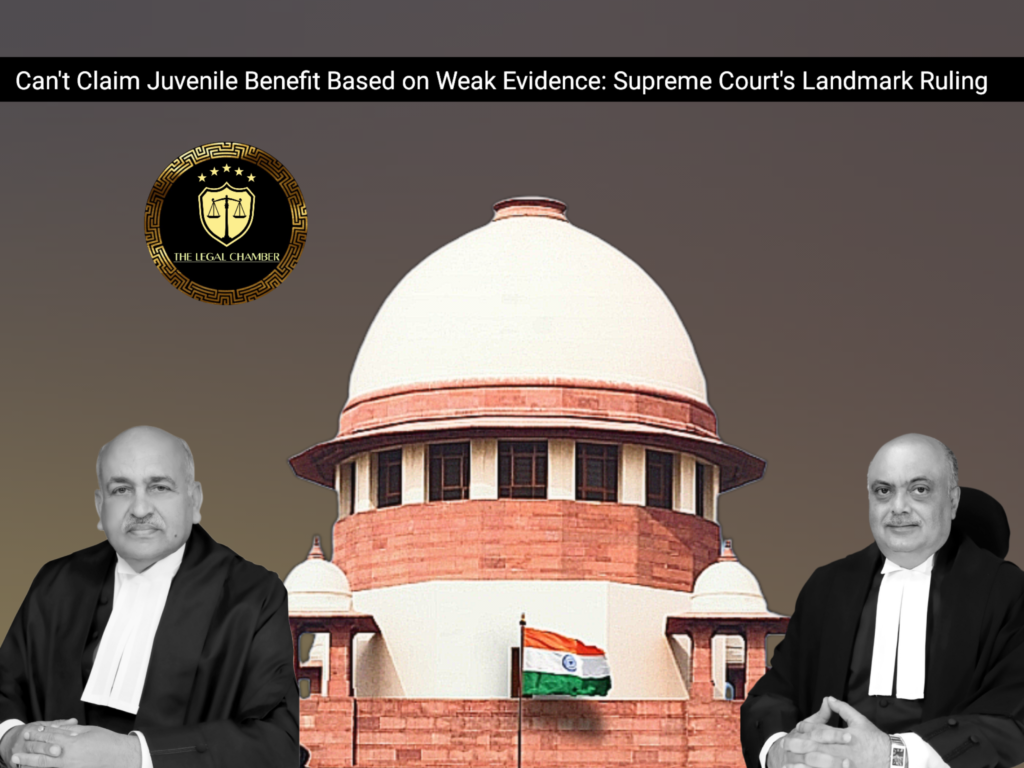
The Supreme Court ruled that a school transfer certificate based solely on an oral declaration, without corroborating proof, is unreliable for determining juvenility. When such evidence conflicts with official documents like a family register, voter list, and medical opinion, the latter must be given precedence to prevent the abuse of benevolent legislation.
Facts Of The Case:
On August 31, 2011, the appellant’s brother, Rajesh, was shot and killed. The First Information Report (FIR) was lodged against Liliu Singh and his son, Devi Singh (Respondent No. 2), under Sections 302 (murder) and 452 (house-trespass) of the Indian Penal Code. The incident allegedly occurred after Liliu Singh and Devi Singh forcibly entered the appellant’s house and manhandled his wife. When Rajesh went to confront them, he was allegedly forcibly taken inside their house, where Devi Singh fired a country-made pistol at him, resulting in his death. During the subsequent sessions trial, Respondent No. 2 filed an application claiming juvenility, stating his date of birth was April 18, 1995, making him 16 years and 4 months old at the time of the incident. The Trial Court and later the High Court accepted school transfer certificates as proof of this date of birth, declaring him a juvenile. The appellant challenged this, producing contradictory evidence including a Family Register listing his birth year as 1991, a voters’ list showing him as 22 years old in 2012, and a medical report estimating his age as 22 years in late 2012.
Procedural History:
The procedural history began with the lodging of an FIR for murder and house-trespass. The case was committed to the Sessions Court as Sessions Trial No. 123/2012. During the trial, the accused (Respondent No. 2) filed Miscellaneous Case No. 04/11/2015 before the Trial Court, seeking a declaration of juvenility based on school certificates. The Trial Court, via order dated May 19, 2015, accepted the plea and declared him a juvenile. The appellant then filed Criminal Revision No. 2144/2015 before the Allahabad High Court, which was dismissed, upholding the Trial Court’s order on March 29, 2016. The appellant subsequently filed the present Criminal Appeal No. 347 of 2018 in the Supreme Court, which allowed the appeal, set aside the orders declaring the respondent a juvenile, and directed he be tried as an adult.
READ ALSO :Supreme Court Doubts Precedents, Says No-Fault Law May Cover All Deaths in Accidents, Not Just Third Parties
Court Observation:
The Court observed that the school transfer certificate, the sole basis for the juvenility claim, was unreliable as its entry was made solely on an oral representation by the accused’s father without any supporting documentary proof. It held that such a certificate, from a private school, does not qualify as a public document under the Evidence Act. The Court emphasized that when documentary evidence like a statutory Family Register, Voters’ List, and a Medical Board report consistently contradict a claim of minority and create reasonable doubt, the medical opinion based on scientific investigation must be given precedence. It ruled that benevolent legislation like the Juvenile Justice Act cannot be allowed to be abused as a ploy to subvert the course of justice in heinous offences.
Final Decision & Judgement:
The Supreme Court allowed the appeal, setting aside the orders of the Trial Court and High Court that had declared Respondent No. 2 a juvenile. It held that he was a major on the date of the offence and was therefore liable to be tried as an adult for the charges under Sections 302 and 452 of the IPC. The Court directed him to appear before the Trial Court within three weeks to seek bail and ordered the expedited conclusion of the trial by July 2026. The order for his release under the Juvenile Justice Act was also set aside, though he was granted the benefit of set-off for the three years already spent in a juvenile home if convicted.
Case Details:
Case Title: SURESH vs. STATE OF UTTAR PRADESH & ANR. Citation: 2025 INSC 918 Criminal Appeal No: Criminal Appeal No. 347 of 2018 Date of Judgement: August 01, 2025 Judges/Justice Name: Justice Ahsanuddin Amanullah and Justice Pankaj Mithal
Download The Judgement Here